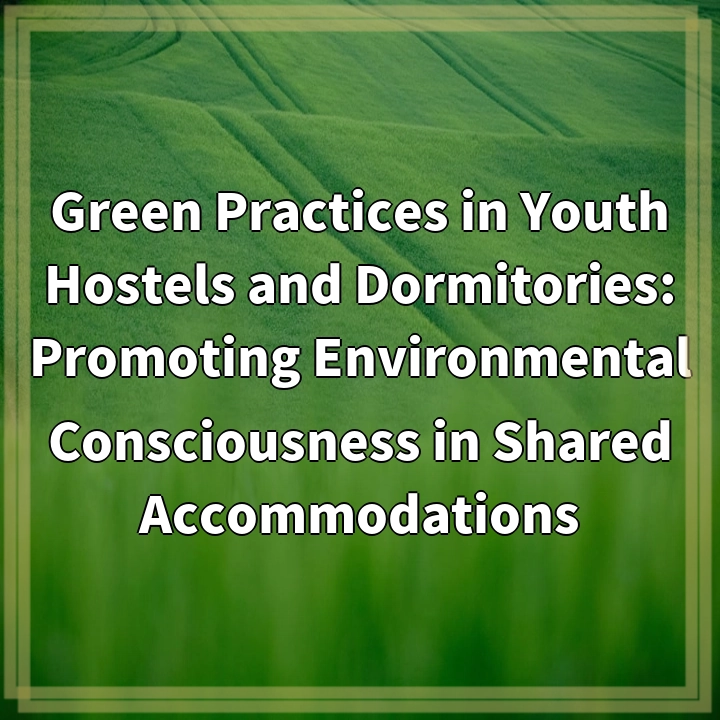
What it is:
Youth hostels and dormitories are popular accommodation options for budget-conscious travelers, students, and backpackers. These shared living spaces provide affordable lodging and a sense of community, but they also present unique opportunities and challenges in terms of promoting environmental consciousness.
Real-world problems:
1. Waste and resource management: With a high turnover of guests, youth hostels and dormitories often struggle with waste management. Excessive food waste, single-use plastics, and disposable amenities can contribute to environmental degradation. Implementing proper waste separation, recycling programs, and reducing single-use items can address these concerns.
2. Energy consumption: Shared accommodations can have a considerable energy footprint due to the presence of multiple occupants and the need for communal amenities such as lighting, heating, and air conditioning. Efficient energy management, including the use of energy-saving appliances and smart technologies, can help reduce energy consumption and promote sustainability.
3. Water usage: In shared accommodations, water usage can be substantial, particularly with multiple occupants using bathrooms, showers, and kitchen facilities. Encouraging water conservation practices like installing low-flow fixtures, promoting shorter showers, and fixing leaks promptly can significantly reduce water consumption and wastage.
4. Limited green spaces: Many youth hostels and dormitories are located in urban areas with limited access to green spaces. This lack of outdoor environments can limit opportunities for guests to connect with nature and engage in sustainable activities. Integrating rooftop gardens, communal green spaces, or arranging nearby outdoor excursions can help address this challenge.
5. Education and awareness: One of the key challenges is fostering environmental consciousness and behavior change among guests. Many travelers may not be aware of sustainable practices or the impact of their actions on the environment. Implementing educational programs, displaying informative signage, and organizing sustainability workshops can help raise awareness and promote eco-friendly behavior.

Solutions to Promote Environmental Consciousness in Youth Hostels and Dormitories:
1. Waste and resource management:
Implement proper waste separation systems and recycling programs. Encourage guests to reduce food waste and use reusable containers. Provide refill stations for water bottles and offer eco-friendly amenities such as biodegradable toiletries. Engage guests through educational materials to promote conscious consumption and responsible waste management practices.
2. Energy conservation:
Install energy-saving appliances and lighting systems. Utilize occupancy sensors to automatically control lighting and regulate temperature. Encourage guests to turn off lights and unplug electronic devices when not in use. Conduct energy audits to identify areas for improvement and invest in renewable energy sources whenever possible.
3. Water conservation:
Install low-flow fixtures, such as faucets and showerheads, to reduce water consumption. Display signage in bathrooms and kitchens to encourage guests to use water responsibly. Regularly check for leaks and repair them promptly. Consider implementing rainwater harvesting systems for non-potable water usage.
4. Incorporate green spaces:
Create communal green spaces within the hostel premises, such as rooftop gardens or courtyards, where guests can connect with nature. Partner with local organizations or parks to arrange outdoor activities or excursions for guests to experience and appreciate the surrounding environment.
5. Education and awareness:
Develop educational programs and workshops to raise awareness about sustainable practices among guests. Display informative signage throughout the hostel to highlight the environmental impacts of certain behaviors. Share success stories and case studies through digital platforms and social media to inspire guests and encourage them to embrace eco-friendly behaviors.















